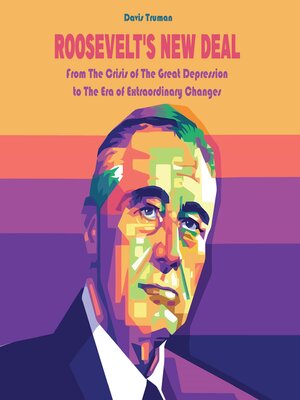
Sign up to save your library
With an OverDrive account, you can save your favorite libraries for at-a-glance information about availability. Find out more about OverDrive accounts.
Find this title in Libby, the library reading app by OverDrive.



Search for a digital library with this title
Title found at these libraries:
| Library Name | Distance |
|---|---|
| Loading... |
The Roosevelt New Deal was a series of domestic programs and initiatives launched by President Franklin D. Roosevelt shortly after he assumed office in 1933. At the time, the United States faced one of the worst economic crises in its history, with unemployment rates exceeding 25%, banks failing, and businesses closing down. In response to this crisis, Roosevelt sought to implement a range of policies to address the immediate needs of the people and the underlying causes of the economic downturn.
The New Deal was based on three primary goals: relief, recovery, and reform. Relief measures aimed to provide immediate assistance to those most affected by the Great Depression, including the unemployed, farmers, and the elderly. Recovery efforts focused on restoring the economy and creating jobs. At the same time, reform measures sought to address the structural issues that had contributed to the crisis, such as the lack of financial regulation and social safety nets.
Some of the critical initiatives of the New Deal included the creation of the Civilian Conservation Corps (CCC), which employed young men to work on public projects such as road building and conservation; the establishment of the Works Progress Administration (WPA), which provided jobs and training to millions of unemployed workers; and the implementation of agricultural subsidies to support struggling farmers.
The New Deal also saw significant changes in the regulation of the financial sector, including the creation of the Federal Deposit Insurance Corporation (FDIC) to insure bank deposits and the Securities and Exchange Commission (SEC) to regulate the stock market. Other reforms included establishing social security, which provided retirement benefits to elderly Americans, and the National Labor Relations Act, which protected workers' rights to unionize.







